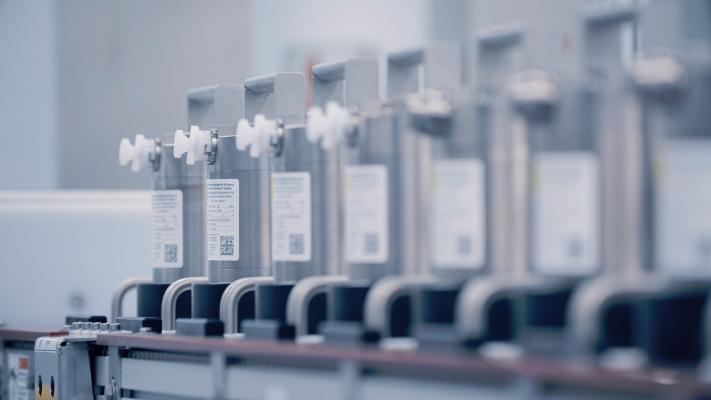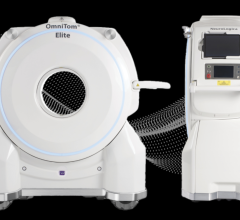
Potassium Molybdate Mo 99 Source Vessels for RadioGenix System (Photo: Business Wire)
February 18, 2020 — NorthStar Medical Radioisotopes, LLC, a global innovator in the production and distribution of radioisotopes used for medical imaging, today announced that the U.S. Food and Drug Administration (FDA) has approved the addition of two molybdenum-99 (Mo-99) filling lines at its facility in Columbia, Mo. Addition of the filling lines is part of NorthStar’s ongoing expansion plans to increase production and capacity of domestic, non-uranium based Mo-99 for the U.S. healthcare system. Mo-99 is a medical radioisotope used to produce technetium-99m (Tc-99m), the most widely used diagnostic imaging radioisotope and of critical importance for patient healthcare. FDA approval of the filling lines was made through expedited review of a Prior Approval Supplement to the original RadioGenix System (technetium Tc 99m generator) New Drug Application, which was approved in 2018. The RadioGenix System is an innovative, high tech radioisotope separation platform for use in producing Tc-99m from non-uranium based Mo-99. Since commercial availability nearly 16 months ago, RadioGenix Systems have provided customers with reliable Tc-99m supply for tens of thousands of patients’ diagnostic imaging studies, despite ongoing shortages from suppliers using legacy, uranium-based production methods.
NorthStar produces non-uranium based Mo-99 in collaboration with its manufacturing partner, the University of Missouri Research Reactor (MURR), in Columbia, Mo., using neutron capture technology. Natural Mo-98 is converted to Mo-99 at the MURR reactor and then processed into a radioactive Mo-99 solution. Filling lines at NorthStar’s facility on the MURR campus transfer the Mo-99 solution into tungsten-shielded containers called source vessels which are then shipped to radiopharmacies that have a RadioGenix System for use in producing Tc-99m used in combination with radiopharmaceutical kits and then injected into patients for diagnostic imaging studies.
“FDA’s expedited review and approval of the additional filling lines in our Columbia, Mo. facility means an immediate increase in Mo-99 production efficiencies in Columbia,” said Stephen Merrick, president and chief executive officer of NorthStar. “This is one component of our efforts to increase dependable, domestically produced radioisotope supply for the United States. We particularly wish to express appreciation to our manufacturing partner, MURR. We look forward to continuing to work with MURR in progressing production efforts for concentrated Mo-98 (cMo-98), which, pending licensures and approval, will dramatically increase Mo-99 production capacity and our ability to provide larger-sized source vessels for our customers. We also want to thank Von Gahlen, who designed, built and installed these state-of-the-art filling lines.”
Merrick continued, “The expansion activities in Columbia run in parallel with NorthStar’s ongoing expansions in Beloit, Wis., where our Isotope Processing facility is nearing completion, and will augment processing at MURR. When approved, we will then have dual Mo-99 production hubs in Wisconsin and Missouri. In addition, construction of our Accelerator Production facility is underway, with the initial pair of electron beam accelerators being assembled in Belgium. We believe that all these efforts will further secure reliable, non-uranium based Mo-99 radioisotope supply for U.S. customers and patients.”
About the RadioGenix System (Technetium Tc 99m Generator)
The RadioGenix System is an innovative, high tech separation platform that is approved for processing non-uranium/non-highly enriched uranium molybdenum-99 (Mo-99) for the production of the important medical radioisotope, technetium-99m (Tc-99m). Prior to availability of RadioGenix technology, the U.S. supply chain for Mo-99 has been subject to frequent and sometimes severe interruptions which negatively impact patient healthcare. Approved by the U.S. Food and Drug Administration in 2018, the RadioGenix System is the first and only on-site, automated isotope separation system of its kind for use with non-uranium/non-highly enriched uranium based Mo-99, designed to help alleviate shortage situations and expand domestic supply.
Indication and Important Risk Information about the RadioGenix System and Sodium Pertechnetate Tc 99m Injection USP
Indication
The RadioGenix System is a technetium Tc-99m generator used to produce Sodium Pertechnetate Tc 99m Injection, USP. Sodium Pertechnetate Tc 99m Injection is a radioactive diagnostic agent and can be used in the preparation of FDA-approved diagnostic radiopharmaceuticals.
Sodium Pertechnetate Tc 99m Injection is also indicated in:
· Adults for Salivary Gland Imaging and Nasolacrimal Drainage System Imaging (dacryoscintigraphy).
· Adults and pediatric patients for Thyroid Imaging and Vesicoureteral Imaging (direct isotopic cystography) for detection of vesicoureteral reflux.
Important Risk Information
· Allergic reactions (skin rash, hives, or itching) including anaphylaxis have been reported following the administration of Sodium Pertechnetate Tc 99m Injection. Monitor all patients for hypersensitivity reactions.
· Radiation risks associated with the use of Sodium Pertechnetate Tc 99m Injection are greater in children than in adults and, in general, the younger the child, the greater the risk owing to greater absorbed radiation doses and longer life expectancy. These greater risks should be taken firmly into account in all benefit-risk assessments involving children. Long-term cumulative radiation exposure may be associated with an increased risk of cancer.
· Discard the first eluate from every new Potassium Molybdate Mo-99 Source Vessel to minimize the risk of unintended radiation exposure from Rhenium Re-186.
· Temporarily discontinue breastfeeding. A lactating woman should pump and discard breastmilk for 12 to 24 hours after Sodium Pertechnetate Tc 99m Injection administration.
· Sodium Pertechnetate Tc 99m Injection should be given to pregnant women only if the expected benefits to be gained clearly outweigh the potential hazards.
· Only use potassium molybdate Mo-99, processing reagents, saline and other supplies, including kits, provided by NorthStar Medical Radioisotopes. Do not administer Sodium Pertechnetate Tc 99m Injection after the 0.15 microCi of Mo-99/mCi of Tc-99m limit has been reached or when the 12 hour expiration time from elution is reached, whichever occurs earlier.
To report SUSPECTED ADVERSE REACTIONS, contact NorthStar Medical Radioisotopes, LLC at 1-844-438-6659; or FDA at 1-800-332-1088 or www.fda.gov/medwatch.
For Full RadioGenix System Prescribing Information, click here or visit https://www.northstarnm.com/wp-content/uploads/2019/08/radiogenix-system-pi-july2019.pdf.
Related Shine Isotope Production News:
Shine Medical Approved to Build Domestic Molybdenum-99 Production Facility
BGN Technologies Introduces Novel Medical Imaging Radioisotope Production Method
Shine Medical Technologies Breaks Ground on U.S. Medical Isotope Production Facility


 May 06, 2025
May 06, 2025 








